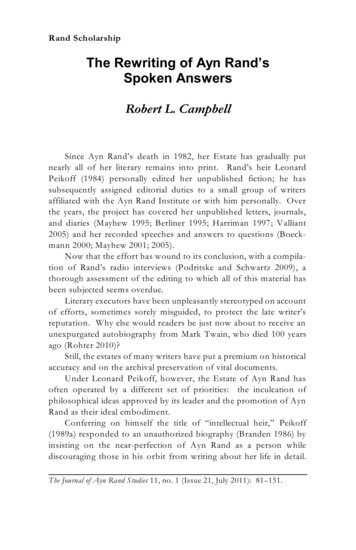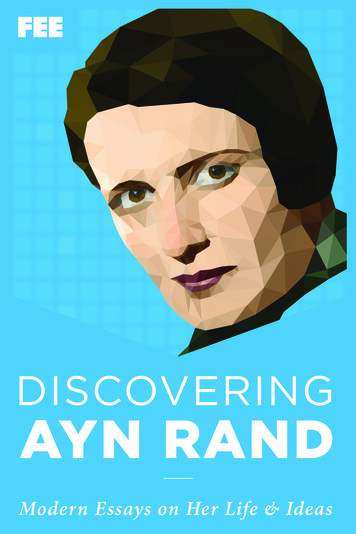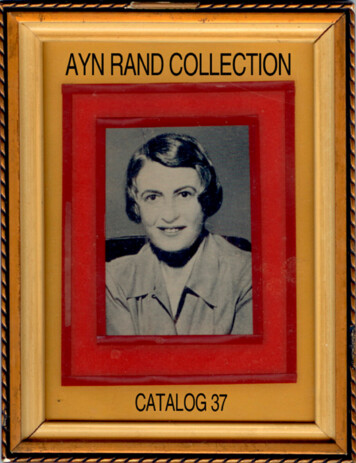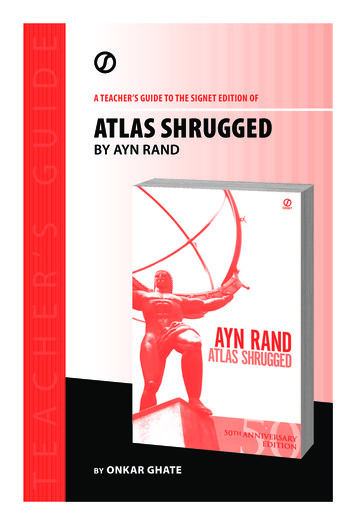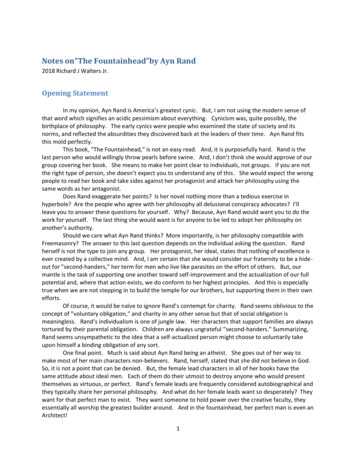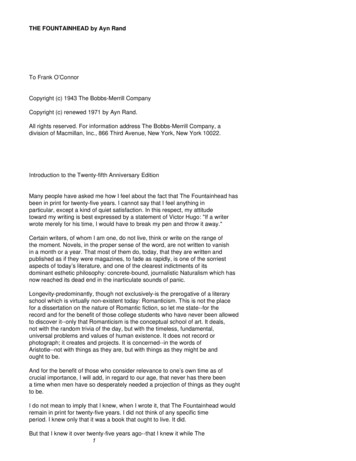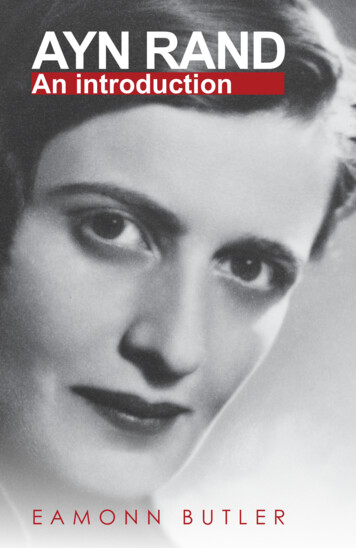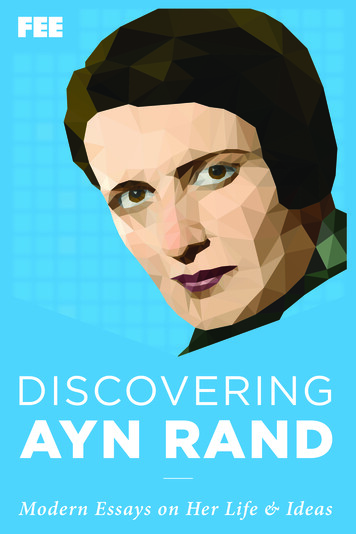
Transcription
DISCOVERINGAYN RANDModern Essays on Her Life & Ideas
DiscoveringAyn RandModern Essays onHer Life and IdeasFoundation for Economic Education
FEE’s mission is to inspire, educate, and connectfuture leaders with the economic, ethical, andlegal principles of a free society.Find us online ine (@feeonline)The Foundation for Economic Education1819 Peachtree Road NE, Suite 300Atlanta, GA 30309Telephone: (404) 554–9980ISBN (ebook): 978-157246-538-1Special thanks to the Institute for HumaneStudies for permission to include Steve Simpson’schapter, “Crony-in-Chief: Donald Trump epitomizesAyn Rand’s ‘Aristocracy of Pull.’”Special thanks to Libertarianism.org forpermission to include George Smith’s chapter,“Ayn Rand on Fascism.”2018Published under the Creative CommonsAttribution 4.0 International License
ContentsPart 1: Your Life and Personality7 Ayn Rand’s Career Advice Is Still on Point by KirkBarbera13 The Sanction of the Victim by Steven Horwitz17 Ayn Rand and the Pony Express by Laurie Rice23 Third World Objectivism by Shanu AthiparambathPart 2: Today’s Politics27 Did Edward Snowden Draw His Main Inspiration fromAyn Rand? by Jeffrey A. Tucker32 Crony-in-Chief: Donald Trump Epitomizes AynRand’s “Aristocracy of Pull” by Steve Simpson48 Would Ayn Rand Approve of Rule by a Rich andPowerful Capitalist? by Christopher Machold51 Trump’s Ego Is Actually Too Small by Dan Sanchez56 Montreal Learned the Wrong Lesson from Ayn Randby Daniel J. Mitchell59 Anthem and the Meaning of the Light Bulb Ban byJeffrey A. TuckerPart 3: Her Books and Ideas66 What the Critics Get Wrong About Atlas Shruggedby Nate Russell
70 What Rand Meant by Altruism by Gary M. Galles74 Ayn Rand on Fascism by George Smith80 We Cannot, Must Not, Give Up Our Ideals by JeffreyA. Tucker84 A Totalitarian State Can Only Rule a DesperatelyPoor Society by Ryan Miller88 Ayn Rand: Sovietologist by Steven Horwitz91 Ayn Rand: A Centennial Appreciation by ChrisMatthew SciabarraPart 4: Her Life and Personality101 Ayn Rand’s Heroic Life by Jeffrey A. Tucker103 Ayn, What if Atlas Snapped? by Kirk Barbera108 That Day I Interviewed Ayn Rand by Jeffrey A.Tucker111 Nathaniel Branden, Rest in Peace by Jeffrey A.Tucker115 Ayn Rand, the Movies, and the Idea of America byLaurie RiceAppendix121 Textbook of Americanism by Ayn Rand
Part 1Your Life andPersonality
Ayn Rand’s Career Advice IsStill on PointKirk Barbera“Look.” Roark got up, reached out, tore a thick branchoff a tree, held it in both hands, one fist closed at eachend; then, his wrists and knuckles tensed against theresistance, he bent the branch slowly into an arc. “NowI can make what I want of it: a bow, a spear, a cane, arailing. That’s the meaning of life.”“Your strength?”“Your work.” He tossed the branch aside. “The materialthe earth offers you and what you make of it.All great writers are polarizing. Ayn Rand, author of TheFountainhead and Atlas Shrugged, certainly fits this proposition.People tend to either love or hate her work. But as WinstonChurchill once said, “You have enemies? Good. That meansyou’ve stood up for something, sometime in your life.”What cannot be denied is the enormity of Rand’s success.After having everything taken from her in Soviet Russia, she fledto America with nothing. She proceeded to work year after year,taking odd jobs; sometimes working on movie sets in Hollywood,sometimes working as a waitress. But she never lost sight of hergoal: to be a novelist.
Kirk BarberaAyn Rand’s Career Advice Is Still on PointIt would take decades—including enduring the greatdepression—before she finally achieved success in writing. Herbooks have sold well over 30 million copies. In fact, Atlas Shruggedhas shaped America’s intellectual landscape. And decades afterher death, not a week goes by when she isn’t mentioned somewherein the public.Below are some quotes taken from various novels, interviews,and other writings, where she explains her views on careersuccess. The advice is applicable not only to Rand’s success but,as you will see, to the careers of any great achiever.Continually Seek to UnderstandEvery man is free to rise as far as he’s able or willing, butthe degree to which he thinks determines the degree towhich he’ll rise.Do not let the hero in your soul perish, in lonelyfrustration, for the life you deserved but never havebeen able to reach. Check your road and the nature ofyour battle. The world you desired can be won. It exists,it is real, it is possible, it is yours.In his autobiographical book, Delivering Happiness: ThePath to Profits, Passion and Purpose, CEO of Zappos.com TonyHsieh conveys his lifelong search for self-knowledge. Beforestarting Zappos, he founded numerous companies, some thatfailed miserably, some that succeeded but in the end, madehim miserable.Starting with a worm farm when he was 9, he moved onto a button-making business in junior high and then variousendeavors in high school and college until he landed a wellpaying job at Oracle—that bored him. He quit and started aFEE 8
Kirk BarberaAyn Rand’s Career Advice Is Still on Pointcompany, LinkExchange, which was the first click-banner adcompany on the web. Eventually, he discovered that he hatedwhat the company had become, so he sold it. Later, he started hisown nightclub, then a variety of other companies.Along the way, he learned lessons about what works andwhat doesn’t, what he loved and what he hated. Finally, he got allthat he wanted with Zappos. Ten years after its founding, it waspurchased by Amazon for over 1 billion.Love the Work“But you see,” said Roark quietly, “I have, let’s say, sixtyyears to live. Most of that time will be spent working.I’ve chosen the work I want to do. If I find no joy init, then I’m only condemning myself to sixty years oftorture. And I can find the joy only if I do my work in thebest way possible to me.”If it’s worth doing, it’s worth overdoing.“What in hell are you really made of, Howard? Afterall, it’s only a building. It’s not the combination of holysacrament, Indian torture, and sexual ecstasy that youseem to make of it.”“Isn’t it?”In Creativity Inc, Ed Catmull, President of Pixar Animationand Disney Animation, explains his lifelong love of technology’sability to bring art to life. As a boy, he sat transfixed as close tothe T.V. as his parents would allow, waiting for the show “WaltDisney’s Wonderful World of Color.” Every week Walt himselfwould explain how the Disney magic was created. He demystifiedit. Catmull fell in love.FEE 9
Kirk BarberaAyn Rand’s Career Advice Is Still on PointFrom then on he dedicated himself to the endeavor of usingtechnology to bring art to life. He worked for George Lucas in adivision of his company that would eventually be sold to SteveJobs. Through twenty years of dedicated work, Catmull stayedtrue to his mission: to create the first feature-length animatedfilm done completely on a computer. Until was born Toy Story.Be PurposefulI want to know that I’ve accomplished something. I wantto feel that it had some meaning. At the last summingup, I want to be sure it wasn’t all—for nothing.A career requires the ability to sustain a purpose overa long period of time, through many separate steps,choices, decisions, adding up to a steady progressiontoward a goal . . . In the course of a career, everyachievement is an end in itself and, simultaneously, astep toward further achievements . . . In a career, thereis no such thing as achieving too much: the more onedoes, the more one loves one’s work.“I do not build in order to have clients. I have clients inorder to build.”As described in Wharton Professor Richard Shell’s book,Springboard: Launching your Personal Search for Success, thefirst TV Chef personality, Julia Child had one maxim for careersuccess: “The more I cook the more I like to cook.” That’s it.She found her craft and dedicated her life to it. Utilizing heryouthful desire to become a novelist, she applied her writingskills in penning the 734-page best seller: Mastering the Art ofFrench Cooking. Then she was asked to teach people how to cookFEE 10
Kirk BarberaAyn Rand’s Career Advice Is Still on Pointa French Omelet on a local television show. The rest is history.Though some random occurrences occurred in her life, there wasone overarching purpose: cooking.Money Is a Means, Not an EndNow I don’t see anything evil in a desire to makemoney. But money is only a means to some end. If aman wants it for a personal purpose—to invest in hisindustry, to create, to study, to travel, to enjoy luxury—he’s completely moral. But the men who place moneyfirst go much beyond that. Personal luxury is a limitedendeavor. What they want is ostentation: to show, tostun, to entertain, to impress others. . . At the priceof their own self-respect. In the realm of greatestimportance—the realm of values, of judgment, ofspirit, of thought—they place others above self, in theexact manner which altruism demands. A truly selfishman cannot be affected by the approval of others. Hedoesn’t need it.“Money demands that you sell, not your weakness tomen’s stupidity, but your talent to their reason.”In the latest biography about Steve Jobs, Becoming Jobs, thebillionaire was quoted discussing money at different stages of hislife. In his younger years, he admired men like Dave Packard,Andy Grove, Charlie Sporck and other empire builders. Jobs said“None of these people were really in it for the money. . . DavePackard, for example, left all his money to his foundation.” Laterin life Jobs explains the purpose of building a great company,“The company is one of the most amazing inventions of humans,this abstract construct that’s incredibly powerful. Even so, forme, it’s about the product. It’s about working together with reallyFEE 11
Kirk BarberaAyn Rand’s Career Advice Is Still on Pointfun, smart, creative people and making wonderful things. It’s notabout the money.”Follow Rand’s advice or not. Your life is yours, as she wouldsay. But the ones who listen and learn for themselves are the oneswho achieve a life worth living.Before you can do things for people, you must be thekind of man who can get things done. But to get thingsdone, you must love the doing, not the secondaryconsequences. The work, not the people. Your ownaction, not any possible object of your charity.Kirk Barbera is a marketing strategist and storyteller.Originally published on Smash Cut Culture, June 10, 2016.FEE 12
The Sanction of the VictimSteven HorwitzFew libertarian authors generate more heated disagreementthan Ayn Rand. Whatever her flaws, she could often bea very sharp observer of human behavior and humanculture, and there are ways to put those observations into usebeyond politics and in interpersonal relationships instead.The primary moral message of Atlas Shrugged, I would argue,is the idea that evil has, to a large degree, only the power that itsvictims grant to it.Consider the image that provides the book’s title. FranciscoD’Anconia asks a party guest,If you saw Atlas, the giant who holds the world on hisshoulders, if you saw that he stood, blood runningdown his chest, his knees buckling, his arms tremblingbut still trying to hold the world aloft with the last ofhis strength, and the greater his effort the heavier theworld bore down upon his shoulders—what would youtell him to do?Francisco answers his own question: “To shrug.”The point here is that Atlas is only a victim because of hiswillingness to think he is morally obligated to suffer, to continuedoing the thing that is crushing him.This concept is refined further in the book and is bestsummarized as the importance of “the sanction of the victim.”
Steven HorwitzThe Sanction of the VictimIn the book’s political economy, this idea refers to the factthat the creators and producers continued to work hard at whatthey love, even as those around them made it increasingly moredifficult to do so.Like Atlas, the weight of the “looters” continued to bear downon the attempts of the producers to keep the railways and steelfactories open. What John Galt does is to try to convince them allthat it is time to shrug—to withdraw their sanction from the verycode that made them victims.For most of the main characters in the book, the key momentis when they realize they are complicit in their own unhappinessbecause they have accepted the moral code of their victimizers.This is why Rand insisted, both in her novels and nonfiction, onthe importance of philosophy, and especially ethics.Characters like Hank Rearden don’t think they need philosophyas they can just continue doing what that they love and ignorethe people who try to bring them down. But without philosophy,Rand argues, Hank and the others who Galt tries to get to joinhim in his strike cannot understand their own victimization.Choosing to ignore ethics simply allows others to dictate theterms of morality, and to the extent that the producers of theworld tacitly or explicitly accept the looters’ morality, they havegiven them “the sanction of the victim.”Whether it’s Atlas shrugging, Rearden leaving his unhappymarriage, or capital going on strike, all of them are connectedby the refusal to bear a burden that has been self-imposed byaccepting without question the (mistaken) moral code of others.This basic idea also has relevance outside the context ofpolitical economy, and understanding it can make your life abetter place.FEE 14
Steven HorwitzThe Sanction of the VictimRearden’s relationship provides one example. If you are in arelationship where it seems impossible to please your partner,despite your best honest efforts to do so, it’s likely to make youmiserable. Here is where it’s worth asking if you bear someresponsibility by having bought into your partner’s problematicvalue scale that makes pleasing him or her impossible.By agreeing to a set of rules that has rigged the game againstyou, you agree to lose and forgo your own happiness. You havegiven that person the sanction that turns you into a victim byagreeing to a code that ensures you can never win.Recognizing this point can improve your life immensely ifyou simply shrug. Naming what’s happening and refusing toagree to the other person’s rules is the first step to happiness,either by changing the rules or ending the arrangement. But youfirst must recognize the role played by your passive acceptance ofa rigged system.You can see this idea at work in the office as well. Co-workerswho make you miserable often do so because they are able toconvince you to play office politics by their rules they created, andthose rules are likely to make you the loser. Again, recognizing thatyou do not need to accept those rules, and sanction the implicitmoral code they involve, is the first step in freeing yourself fromyour victimization.What Atlas Shrugged ultimately asks us to consider iswhether we have thought carefully about the moral rules andethical principles that we explicitly or implicitly accept. If youare unhappy with your life, and especially with your variousprofessional or interpersonal relationships, it is worth askingwhether that unhappiness is of a kind with Atlas trying to carrya weight that he cannot possibly support.FEE 15
Steven HorwitzThe Sanction of the VictimIf so, withdraw your sanction of the rules of a rigged game.Shrug off that weight. Find new rules or different players. AsRand emphasized, your happiness is within your grasp if onlyyou recognize your role in making it possible:Do not let your fire go out, spark by irreplaceable spark,in the hopeless swamps of the not-quite, the not-yet,and the not-at-all. Do not let the hero in your soul perish,in lonely frustration for the life you deserved and havenever been able to reach. The world you desire can bewon, it exists, it is real, it is possible, it’s yours.Steven Horwitz is the Schnatter Distinguished Professor of Free Enterprisein the Department of Economics at Ball State University, where he also isa Fellow at the John H. Schnatter Institute for Entrepreneurship and FreeEnterprise. He is the author of Hayek’s Modern Family: Classical Liberalismand the Evolution of Social Institutions.Originally published at FEE.org on May 21, 2015.FEE 16
Ayn Rand and thePony ExpressLaurie RiceOn April 3, 1860, the first rider of the American PonyExpress took off from St. Joseph, Missouri. Aroundmidnight on April 13th, the final rider in the 10-dayrelay clattered on his horse into Sacramento, California. Themail he carried had been borne at a gallop across the desert ofthe American West. Ultimately, the journey of the Pony Expresswould continue criss-crossing the country for eighteen months,transmitting messages about the gold rush in California, Lincoln’sinauguration, and the Civil War.The Pony Express company conceded to the transcontinentaltelegraph in 1861, losing the government mail contract thecompany’s founders had sought. But it had forever heightenedexpectations of speed in letter delivery, and, of course, had gaineda place in the American imagination.Over 150 years have passed since the inaugural run of the PonyExpress, and there was no better celebration of its memory thanGoogle’s instantly iconic doodle. And there was no better entityto do it: The Pony Express’s founders sought to compartmentalizeand distribute a 1900 mile pilgrimage across America in orderto speed up communication. Google now compresses massiveamounts of data and connects billions of people in order to put aworld of information at our fingertips.
Laurie RiceAyn Rand and the Pony ExpressThe doodle was one of Google’s occasional interactive logos,meaning it was actually a short video game, and it can now befound and played in the archives here. It was designed by MarkIvey, Kris Hom, Brian Murray, Kevin Laughlin, Greg Capuano,and Matt Cruickshank.I was completely charmed by this game, and it’s anotherinstance of video games becoming a common cultural medium,emerging as a mainstream art form out of its rarified audiences,such as gamers or technology geeks. (See Minecraft, Video Games,and Objectivist Values). A search of the hashtag #ponyexpresson Facebook, Twitter, and Instagram revealed people all overthe internet sharing their high scores and their delight at thegame’s illustrations.The game begins with a “play” prompt embedded in theGoogle logo, written out in Wild West font based on the reallife advertisements used by the Pony Express. A stylized, cartooncowboy rides atop a comically round horse, their sillinessheightened by the furious pace of the pony’s tiny animated legsand the determined expression on the cowboy’s face.FEE 18
Laurie RiceAyn Rand and the Pony ExpressThe game’s soundtrack kicks in, which is a full-throttle clipclopping gallop effect, three beats up and three beats down, withtwo extra beats which somehow ratchet up the excitement andheighten the sense of riding a slightly out-of-control horse in aslightly out-of-control commercial venture.Real life riders ended their stint with either a handsomepaycheck or various terrible incidents, such as exhaustion, injury,or attacks by native tribes. The Google pony rider faces cactuses,avalanches, rocks, structures, and bandits.Google’s pony has its own idea of things, and glares at therider for mishaps, sympathizes about the snowbanks, mocks himfor falling in water troughs, and claims all the credit at the end ofthe ride. The pony has its independent streak, but as the doodle’ssummary says, “Ultimately, what’s more important than earningtrust and respect from a horse?”The one thing rider and pony always agree on is the importanceof the letters, which you collect at top speed as you race throughthe route. The game entertainingly calls on references which arejust at the corners of cultural memory, such as the special mailbag, called a Mochila, developed for the Pony Express to fit overthe top of a saddle.FEE 19
Laurie RiceAyn Rand and the Pony ExpressIn the game, when your pony skids to a halt at the station,the mail bag flips forward through the air with the rider, bothlanding in place in a funny way on the next horse.Although the silliness of the illustrations invites us to laugh,we’re also earnestly engaged with the rider’s task of getting themail to its destination. Whatever the obstacles of his adventure,he is met at the end by a glorious reception line in an old-timeytown, people cheering and waving parasols as pony and messengersprint to the final station.The lightness of the game isn’t at the expense of the PonyExpress, but reflects the lightness of hope in an amazinghistorical moment. We know the “Wild West” was a dangerousand difficult experience, and a complicated period in history, butit also represents a fantastic individualism and freedom.We celebrate the off-screen entrepreneurs of the PonyExpress, who saw an opportunity to create value and pursuedit. We celebrate the adventurousness of the employees of thePony Express (this is where Buffalo Bill rose to fame). And wecelebrate the small town—an emerging social order receivingnew information to be used for the next step toward prosperity.FEE 20
Laurie RiceAyn Rand and the Pony ExpressWe can see from the Pony Express game in what ways a videogame is a form of art. In The Romantic Manifesto, Ayn Rand said,“The proper forms of art present a selective re-creation of reality[.] according to an artists’s metaphysical value judgments. . . .Art isolates and integrates those aspects of reality which representman’s fundamental view of himself and of existence. . . . It tellsman, in effect, which aspects of his experience are to be regardedas essential, significant, important.”Literature reveals the artist’s value judgments through theuse of concepts. The visual arts reveal the artist’s recreation ofexistence through sight and touch. Music reveals the musician’schoices about audio perception, and provides a direct experienceof certain abstract cognitive and emotional processes.Motion pictures, when presented as stories and not just as arecord of information, became a form of art after the technologybecame available. (Incidentally, the first motion picture evercreated featured a running horse, and solved the mystery ofwhether the horse completely leaves the ground while running:It does.)Like motion pictures, video games combine the story tellingof literature, the visual arts, and sometimes music. They arerepresentational, as art must be. And they bring man’s conceptsto the perceptual level of his consciousness, allowing him to graspthem directly, as if they were precepts. Video games are evenimplicitly Romantic, as they most often present a protagonistdeliberately pursuing a goal within a knowable universe.In some ways video games push the boundaries of Ayn Rand’sdefinition of art, which presupposes that the enjoyment of artis contemplative: the artist is the one who does the selective recreating, the viewer responds. But the player’s participation in agame is still within the selective power of the game’s creator—IFEE 21
Laurie RiceAyn Rand and the Pony Expresscan move the rider and pony within a certain range, but I can’tdirect the rider to do something else entirely.The video game is a form of art which can present and explorehuman will. In the Pony Express game, I can have containedexperiences of rationality, independence, and courage. I respondwith emotions of determination, fear, frustration, excitement, andpride—a smaller scale of the same emotions that the owners andriders of the actual Pony Express must have felt in their adventures.Video games let us live in a created world and make our ownchoices. They let us experience art in a manner similar to howwe experience real life. Google’s Pony Express doodle is a fineexample of how video games are expanding their power as art,showing us how life could and ought to be. Play Google’s Pony Express game. See “Minecraft, Video Games, and Objectivist Values“ atThe Atlas Society. Check out “Are Markets Ruining Video Games?“ inthe Freeman. Behind the Doodle by googledoodles on Youtube.Laurie Rice is a writer and owner of Precision Social, a social mediabusiness. She’s the author of many articles on the topics of Ayn Rand,libertarianism, feminism, and technology.Originally published at FEE.org on May 12, 2015.FEE 22
Third World ObjectivismShanu AthiparambathAyn Rand died on this day, 32 years ago. Today, youngIndians are snapping up her books at a surprising rate.It’s an apparent contradiction. Howard Roark, TheFountainhead’s main character, is a man with strong principles.But he’s also arrogant. Here in India, humility is considered thefundamental moral virtue. He might have been put away for avery long time had he lived here. In any event, he could not havereached many people through rational arguments, due to whatRand described as “the mystic muck of India.”But, for many young Indian men and women, Roarkepitomizes individualism and strength of character. And muchto the chagrin of their boyfriends, many women want their mento be more like Roark. A college mate once told me, “Women donot know that it is not possible for a man to be Howard Roark. Hecan only pretend to be Howard Roark. Hell, he can’t even pretendto be Howard Roark.”It’s strange. For nearly four decades after Indian independence,every aspect of the Indian economy was “planned” and “regulated”by the socialistic state. The economy has liberalized somewhat inthe past two decades, but still remains one of the most controlledin the world.Virtually every literate Indian has heard of Karl Marx. Andso, the typical Indian’s beliefs are much closer to Marx’s.Outside the market niche she has found, Rand is virtuallyunheard of. But that appears to be changing. Rand outsells Marx
Shanu AthiparambathThird World Objectivismsixteenfold in India today, which suggests rapid growth. Thisstatistic is in all likelihood an underestimation: I first noticedher works in rickety street stall in a small town. The copieswere pirated.No one seems to know why Rand is becoming so popularin India. India has a huge population, but even today, Englishlanguage fiction is read by a minority elite. It is true that Randwrote popular fiction. Marx’s prose is dense. But that still doesnot explain why Rand outsells even many well-known Indianwriters and best-selling western writers in Indian markets.Even in the United States, where various strands of thoughthave found their own niches, Rand’s views are considered wayoutside the mainstream. It is a minor miracle that she couldbuild a whole movement in a western capitalistic democracy. Butwhy is she becoming increasingly popular in societies that bearno resemblance whatsoever to whatever ideal society she hadin mind?I can only hypothesize. But part of the reason must be thatthe intelligent young men and women in traditional, conservativesocieties know that the dystopian world her fiction depicts is nottoo unlike the world in which they live. Indians have experiencedthe extremities of government tyranny firsthand. Libertariansoften cite the government as the source of evil, but not all evils flowfrom the State to the masses. The inept, corrupt governments ofthe Third World can be a reflection of the popular soul. In India,at least, the State can institutionalize the little people’s vices.In The Fountainhead, Peter Keating’s mother dictates his lifewith the sweetest of smiles on her face, saying, “Petey, I neverthink anything. It’s up to you. It’s always been up to you.” Thevillain in The Fountainhead is Ellsworth Toohey, a manipulativeintellectual, and not a government bureaucrat or a politician.One character says Gail Wynand represents everything that’swrong with the world, but Wynand is a newspaper publisher.FEE 24
People subscribed to The New York Banner because they preferredvulgarity over truth and beauty, and not because the politiciansor bureaucrats forced them to.Rand was one of those writers who saw politics for what it is—inside and out, macro to micro, down to the level of the individual.It is probably futile to curse mediocrity, but in the ThirdWorld, ineptitude and politicking reach epic proportions—andare present in nearly every aspect of our lives. As in Rand’sfiction, this is not always official, congressional politics. It is truethat many rebellious Indian teens find Rand’s individualisticworldview appealing. But I believe they also feel that the worldaround them reminds them of the poolroom that Wynand onceworked in. That is, the young men and women in India seenothing but dishonesty and corruption around them.Even in the best hospitals in the largest Indian cities, thedoctors diagnose patients without really speaking to them. Whenyou lie on a hospital bed, you know you have written a blankcheck to doctors who have life-and-death power over you. OnNovember 9, 1965, when the lights of New York City and the entireEastern Seaboard went out, an admirer wrote to Rand, “There is aJohn Galt.” But in India today, even in the largest cities, the lightscan go out at any moment.So, appearances aside, it is hardly surprising then that Randappeals to young men and women in collectivist societies. Shetold them the truth about the world in which they live.Shanu Athiparambath is a writer who lives in Delhi. He is working on hisdebut novel on human heterogeneity.Originally published at FEE.org on March 6, 2014.
Part 2Today’sPolitics
Did Edward SnowdenDraw His Main Inspirationfrom Ayn Rand?Jeffrey A. TuckerSomething has always bugged me about the case of EdwardSnowden. He worked in a massive professional machineryof enormous power, prestige, and money. His world was thepinnacle of achievement for his skill set. Everything about themassive surveillance state broadcast that there was no escape.Everything about his environment demanded compliance,service, and submission. His job was to check at the door hisindividualism, integrity, and charact
70 What Rand Meant by Altruism by Gary M. Galles 74 Ayn Rand on Fascism by George Smith 80 We Cannot, Must Not, Give Up Our Ideals by Jeffrey A. Tucker 84 A Totalitarian State Can Only Rule a Desperately Poor Society by Ryan Miller 88 Ayn Rand: Sovietologist by Steven Horwitz 91 Ayn Rand: A Centennial Appreciation by Chris Matthew Sciabarra Part 4: Her Life and Personality

